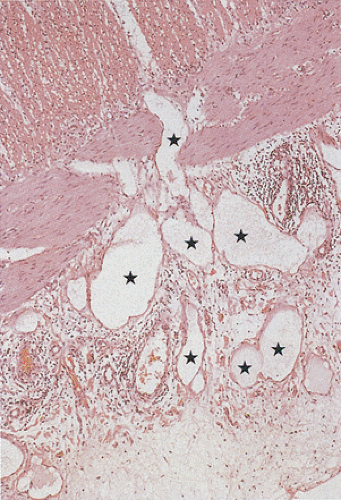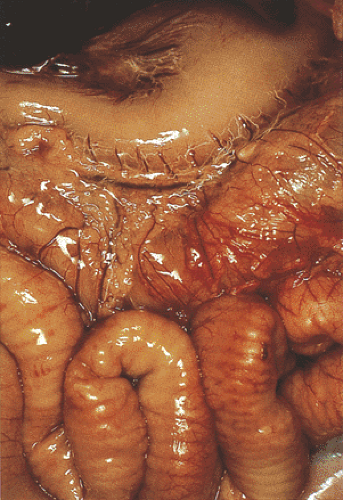Pneumatosis Intestinalis
Two forms of this relatively rare condition affect the intestines. The most common form affects patients with obstructive pulmonary disease and results from air dissection through the spaces around the great vessels and their abdominal branches. Patients generally do not have specific intestinal complaints. The second form of the lesion results from the presence of gas-forming bacteria in the bowel wall due to prior mucosal ulceration and secondary bacterial invasion. The second form commonly affects infants suffering from fatal colitis or ileocolitis, or adults with ischemic bowel disease (647). This form often runs a fulminant course. Gas-filled cysts occupy the subserosa, submucosa, or both (Figs. 6.235 and 6.236).
 FIG. 6.234. Lymphatic dilation secondary to obstruction. The dilated lymphatic spaces are indicated by stars. |
Pneumatosis intestinalis (PI) involves the large and/or the small bowel and affects both infants and adults. The clinical features vary, depending on the underlying condition with which it is associated (647). Symptoms from the underlying disease may dominate the picture. Thus, in infants, coexisting necrotizing enterocolitis dominates the clinical and pathologic features. In adults, symptomatic patients develop diarrhea, flatulence, and excessive mucus in the stool. Other symptoms include constipation, rectal bleeding, passage of mucus via rectum, vague abdominal discomfort, abdominal pain, increased flatulence, urgency, malabsorption, and weight loss (647).
Stay updated, free articles. Join our Telegram channel

Full access? Get Clinical Tree









